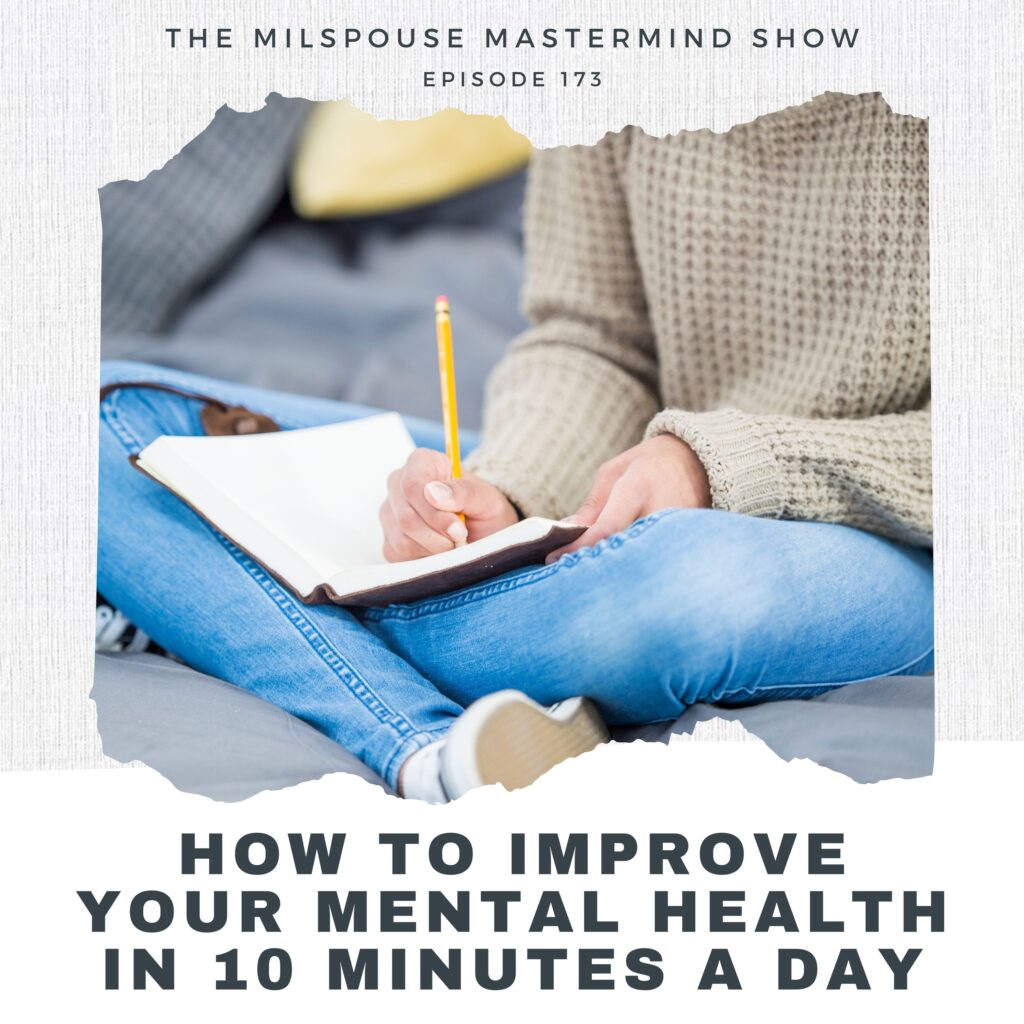
Sometimes good ideas can become problematic. Last week, we talked about how a positive mindset can turn into toxic positivity and how “embracing the suck” can actually lead us to resentment, rather than helping us overcome adversity and build true resilience. The key to tapping into the best of both these concepts lies in becoming aware of our feelings and emotions, so that we can process them in a healthy way.
While this process begins with mindfulness, and bringing awareness to what we’re thinking and feeling, there’s a little more to the story. Awareness alone is not enough. Today I’m walking you through a specific process that you can use to increase your focus, boost your mental health and transform your life (in only 10 minutes a day).
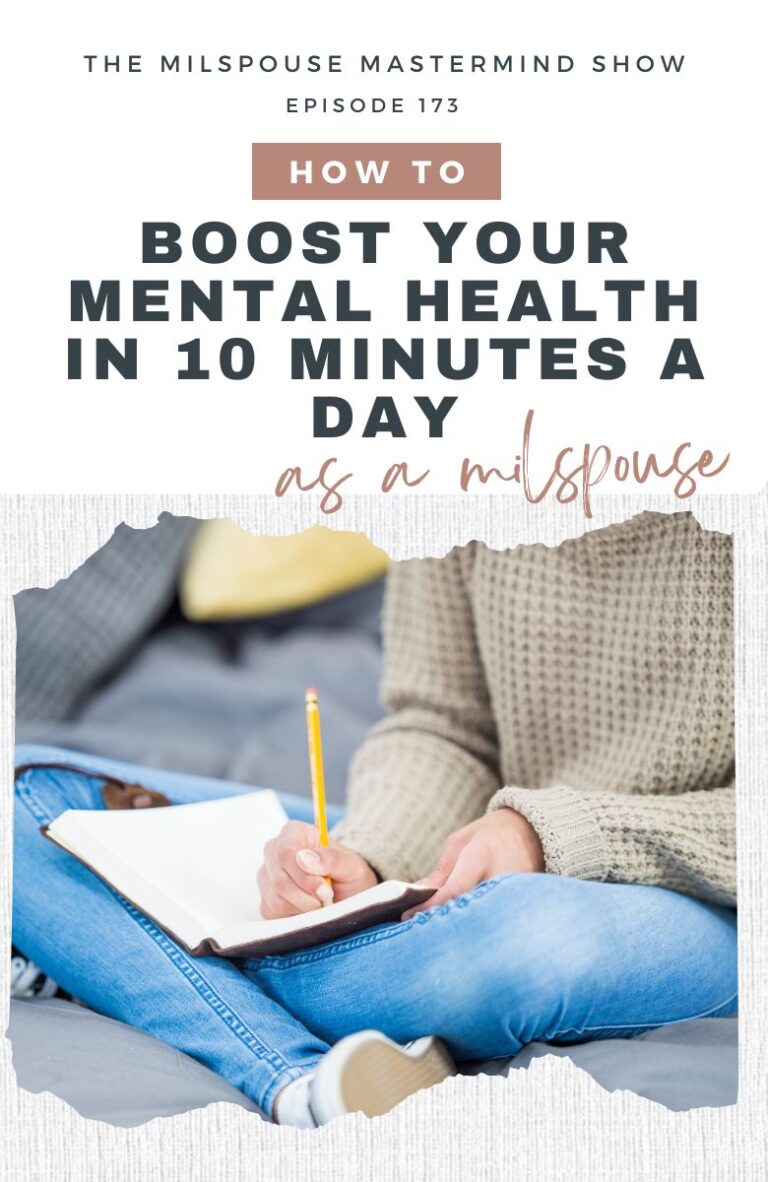
Ep 113 – Unlock the Power of Mindfulness In Your Life (One Minute Mindfulness Practice)
Ep 153 – Want to Live with Less Overwhelm? How a Morning Routine Can Help
Ep 22 – How to Practically Own Your Day So It Doesn’t Own You
Headspace App – Free for Blue Star Families members
Start Here- Self Assessment: https://milspousemastermind.com/growthwheel
Clarity Workshop: https://milspousemastermind.com/workshop
Join the Community: https://milspousemastermind.com/community
What Matters Most Worksheet: https://milspousemastermind.com/values
Discover Purpose Course: https://morethanamilspouse.com
Leave a Show Review: https://milspousemastermind.com/show
Work With Me: milspousemastermind.com/unstuck
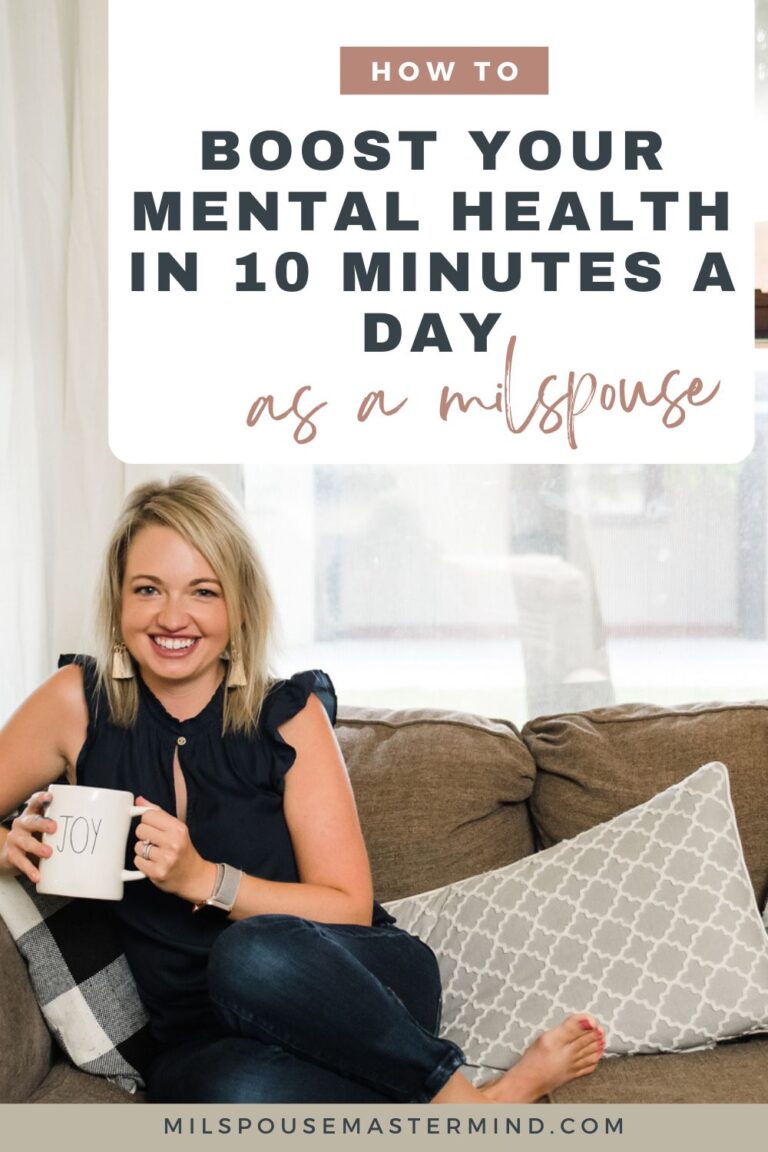
[00:00:00] Christine: Welcome back to the MilSpouse Mastermind Show. I’m your host, Christine, here with you to share another episode about how we can trade our frustration for fulfillment as military spouses. Last week, we discussed two helpful concepts and how they can actually become problematic and instead keep us trapped.
[00:00:20] We talked about how a positive mindset can turn into toxic positivity and how embracing the suck can actually lead us to a place of resentment rather than helping us overcome adversity. And the key to utilizing the power of positive thinking and embracing the suck lies in making space for, and being able to process our feelings and emotions in a healthy way.
[00:00:52] But what does that look like in real life? life. That is what we are talking about today. I’m going to walk you through a process to help you stop burying those thoughts and feelings and emotions and actually help us improve our mental health and build true resilience. If you want to know how I know this process works, it’s because I stopped doing it this summer and my mental health taint.
[00:01:20] They absolutely don’t want that to happen to you. So find out what got in the way of me taking care of my mental health and how you can use this process to transform your own life. in just 10 minutes a day.
Did you know there is a brand-new resource available to help you thrive and live with more meaning and less overwhelm as a military spouse?
[00:02:37] It is a guide to help you meet your people and find community. Now I know this sounds cliche, But the number one thing I hear from military spouses is that they struggle to make connections and find community in a new place. And there’s a lot of things that I can’t do to make that process easier for us.
[00:03:00] But what I did do that is going to help us is create a guide to help us navigate through those awkward get to know you conversations. Those events where we don’t really know anyone and we’re trying to and having to do a little more work to actually start meeting people. You’ll get tips on where to go, how to meet people, and what to say to get through the…
[00:03:27] awkward get to know you conversations so that you can actually find your people and really thrive where you are stationed. You can get your free guide by going to milspouse mastermind. com slash connection or just click the link in the show notes below. Now, before we get started today, I want to put a disclaimer out there.
[00:03:51] I am not a therapist. I am not a doctor. I am, what I’m saying today is not going to fix. All mental health issues. Sometimes there’s a lot going on. If you are struggling in a particular area. If you have some major issues from your past. Or there’s any kind of trauma there. I’m definitely going to recommend that you talk with someone who’s trained in that area.
[00:04:18] That you see a licensed professional. But what we’re going to be talking about today are basic tips for improving our mental health and helping us process our thoughts and feelings and emotions in a healthy way. Because when we don’t do that, we began to feel stuck. We began to feel resentful, frustrated, confused, lost, exhausted, tired of trying to be resilient or being told that we are resilient when we don’t feel like it.
[00:04:53] And our mental health starts to do this viral downward pretty quick, which is exactly what happened to me this summer. There have been times in my life where I have struggled with feelings of depression. There have been times when… Anxiety has been a big issue for me. There have been times where I felt completely stuck, frustrated, and uninspired.
[00:05:22] But I’ve done a lot of work on myself. I’ve tried a lot of things, and I have figured out a lot of ways that When I show up, when I do these practices, it improves my overall mental health and my outlook on life. And that is not to say that I don’t still have days where I struggle. That I don’t still have seasons where I struggle.
[00:05:48] Moving is absolutely challenging every single time, no matter how much work I’ve done. There are still days in the PCS process when I am just fed up and frustrated with it all. But I know that if I am intentional, if I do the things that I know will help, I always come through stronger on the other side.
[00:06:13] And if you would have asked me, to assess my mental health in March, April, May of this year. I would have told you that I was in a really healthy headspace. We were not moving this summer. We were finally established in one spot. And I had done a lot of work to process my thoughts and feelings and emotions.
[00:06:40] And then, summer happened. And for whatever reason, I thought to myself, you know, I am doing really good in this area. And maybe I can relax and prioritize some other things. Because there’s only so many hours in a day, right? And so, I knew my kids were going to be home all summer. I knew that I wasn’t going to get a lot of focused alone time.
[00:07:07] And… Most of the time, I am extremely intentional about carving out time for a morning routine. About taking some time before my kids are up and asking me questions to focus on myself to pray and to set intention for my day. And I had this idea, why don’t… I use the time that I would typically spend investing in myself before my kids get up and try to do a power hour, get some work done before I’m being interrupted.
[00:07:42] It’s really hard with the ages of my kids right now. When I am trying to think and get work done and they are coming in every five minutes to ask me a question or to tell me a story or whatever, it is hard to get work done during the summer.
[00:08:02] So I thought, you know what, I’m gonna try this power hour of work and get some stuff done before my kids are up in the morning. And in order to do that, I’m gonna take a step back from my normal morning routine and what I am doing to invest in myself and my mental and spiritual health in the morning.
[00:08:22] Y’all, it was not good. I was frustrated. I was more short tempered. I was a lot more emotional. Now, there were some extenuating circumstances that, some added stressors that made the summer more challenging than some of our previous summers. I mean, I know it’s, A different form of stressor, because PCS summers are very stressful.
[00:08:51] But there was some added stress going on, and was I taking more time to deal with that stress? No. And it did a number on my… Mental health and the reason I’m sharing this with you is that number one when I talk about what? Practices I recommend we do and I’m saying this from personal experience I’m saying this from something that I have tried and implemented and in my own life and number two I want to be honest with you and say, you know Just because I have this podcast just because I am the one helping us talk about what?
[00:09:29] practices we need in our life and Doesn’t mean that I do this right 100 percent of the time. It just goes to show that no matter how much work we do on ourselves, there is always growth and learning. And we have to make these practices part of our lives, or we will start…
[00:09:47] to move backwards. We’re either going to be moving towards the person we want to be or farther from the person that we want to be. Now, all of us know that our mental health matters. We know that we just don’t feel good when our mental health isn’t great. We know that We don’t like feeling stuck, but sometimes it’s hard to know what to do when we feel stuck, and sometimes it’s just hard to do the things, even if we know what we’re supposed to do, because we just don’t feel motivated to change.
[00:10:23] We, we’re more comfortable staying stuck than we are doing what we know will help us. I see this in my kids all of the time. I, I tell them, you know, Hey, you’re gonna feel better if you just take a few deep breaths. And they know that, but they’re like, I don’t want to take the deep breath. I want to be upset about this situation.
[00:10:46] So, I absolutely get all of this, but what I want to do is paint a picture for you today of helping you see that it’s not just the overall sense of how you feel, but how this can specifically impact your life . And then we’ll walk Through how to get started because I want to make this practical. We will wrap up with three specific tools that have been really helpful in my own life.
[00:11:20] First let’s talk about Why this matters, and what the research tells us about how this actually impacts our life. When a toxic mindset dominates our thinking, it has a negative effect on our decision making, our ability to switch attention, on our working memory, on our ability to maintain abstract rules. And our ability to respond appropriately to situations. But when we are able to change our outlook on life, it improves our cognitive ability, it reduces our stress and our anxiety, it reduces symptoms of depression, it increases our sense of well being, it helps with pain management. It can improve quality of life if we are living with a chronic condition.
[00:12:28] It helps us become more engaged in life. It improves our focus and ability to concentrate. It improves our ability to take action in times a stress and improves our sleep. If I were to tell you Do you want to have better working memory? Do you want to improve your mental health? Do you want to have better energy flow?
[00:12:56] Do you want more peace and purpose in your life? Do you want less stress and anxiety? I think all of us would say, absolutely, yes, we want this, because the fact of the matter is, if our mind is not right, nothing else is going to be right. But we have the power to shift the way that our brain processes information so that we can have all of these beneficial outcomes that we really
[00:13:26] So how do we begin to change the way our brain is processing this information so that we can get these benefits and ultimately improve our mental health?
[00:13:42] Well, I want to talk through three things that we can do. And the first thing is carving out the time for this, making space in our calendar, in our daily schedule. Now, do you have to carve out a lot of time? No. This is about how we do this in 10 minutes a day. Waking up 10 minutes before your kids.
[00:14:07] Now, I know kids sometimes like to wake up early.
[00:14:11] I get up early. My kid wants to get up early. I totally get that. I one of my kids this morning, actually, I was sitting on the couch writing in my journal, and she came up and pulled out her journal and said, Mom, what are we journaling on today? So, they are learning and observing, and now that they are a little bit older, this makes this practice a little easier when they don’t need me.
[00:14:36] all the time. So I absolutely understand that there are challenges to this and it, we just kind of roll with it and do the best that we can. There is so much grace for you in this. But number one thing is to actually carve out some intentional time in your day. Now, does it have to start with 10 minutes? Absolutely not.
[00:14:57] Going to step two is to start with mindfulness. And mindfulness is really just about being able to be present in the moment. To have the state of awareness and openness and to not to be able to not be overly reactive or overwhelmed by what’s going on. A lot of the time, when we hear the term mindfulness, the first thing that we think of is meditation, and meditation is absolutely a type of mindfulness.
[00:15:36] Deep breaths, that can also be a form of mindfulness because it’s helping, number one, regulate our emotions, and number two, helping us be more present in the moment and notice what’s going on around us. Going back to episode 113, which I will link below in the show notes, where we talked about unlocking the power of mindfulness in your life.
[00:16:05] And in that episode, with Dr. Janelle McCulley, she gave us a one minute mindfulness practice. So that is an absolute great place to begin, with one minute a day to start practicing mindfulness. So the first step is to actually be intentional with carving out some time to focus on your mental health. The second step is to develop a mindfulness practice.
Awareness may be the greatest agent for change. But awareness without action can leave us feeling worse.
[00:16:38] But the third step to this goes beyond mindfulness. And what I’m calling a mind management routine. Because mindfulness gives us that awareness. But then we actually have to do something with the thoughts and feelings that we become aware of. So mind management is this process of processing our thoughts and emotions in a healthy way so that we don’t get trapped and stuck. Dwelling on those negative thoughts and feelings and emotions. Now, there is a whole lot of science behind this, there is an entire book about this process which I will share at the end of the episode.
[00:17:11] I just want to give you a 10-minute mind management routine today to help you start this process of not only becoming aware of your thoughts and feelings, but knowing how to process them to move through it and to begin to be able to reframe those thoughts and emotions. So let’s say you have ten minutes a day. I’m going to give you five things you can do, two minutes for each of these steps.
So step number one is awareness. This is where you’re just taking a few deep breaths and checking in with yourself to say, What’s going on right now?
[00:18:12] What is on my mind? What am I thinking? What am I feeling? What sensations do I have? in my body. That’s really just observing what’s going on. The second two minutes are just that time to reflect. Okay, why am I feeling this? Why am I having this thought? What’s really the root of this? It’s that ability to give some perspective and ask the question, why?
[00:18:43] Why is this happening? What’s causing this? What’s really going on here?
[00:18:48] The next two minutes are where you just journal what’s coming up for you. Just spend a couple of minutes saying, Okay, what’s really going on here?
[00:18:59] I have some tightness in my neck and shoulders. I’m really worried about… Trying to get everything on my to do list done today. I have a lot going on. What’s really going on here? Well, there’s this underlying story that I don’t manage my time well, and I’ve been telling myself Hey, you’re terrible at time management. So after I have gotten the awareness, I’ve observed what’s going on and what’s really underneath that, then I’m going to look at how can I reframe this.
[00:19:37] Instead of telling myself, this, I feel overwhelmed because I’m terrible at time management, I will tell myself a different story. What is something I can think instead? So maybe the thought instead is, I, I am able to prioritize the things that matter most today. And then the last two minutes of this is just saying how am I going to apply this -reframed thought to my life.
[00:20:13] So if the reframe is that I tell myself I can prioritize what matters most today, then the application is that I’m going to sit down and make a list of all 10 things that need to get done that day. And then I’m going to say what is most important and I’m going to prioritize that list and I’m going to do the things in order of priorities so that the most important things get done.
[00:20:42] So in 10 minutes, I’ve been able to to identify what I’m feeling. What is actually underneath that feeling of stress or overwhelm? What thought is behind that? How I can reframe that thought, and then what actions I’m going to take to write a different story. So, let me give you one more example just to show you how this works in real life.
[00:21:14] So, let’s say I start by just taking some breaths, checking in with my body, figuring out what’s going on, and I have a sense of tension. Okay, what’s behind this tension is the fact that yesterday I did not have a great day. Parenting day and now the thought that I’m having is I’m a bad parent. So instead of telling myself that I’m a bad parent because I messed up, what is a difference?
[00:21:53] Story I could tell myself. Could I tell myself that I am a parent that deeply loves my kids? Okay, then the last step is what is something that I’m going to do Today to reinforce that new thought, that changed thought. Maybe I’ll carve out time To spend five minutes doing whatever my kid wants to do. Or maybe I’m going to be super intentional about telling them to have a great day on the way to school.
[00:22:30] Whatever it is to say I’m reframing this thought that I’m having about myself. for my circumstances, and then I’m going to choose an action to help reinforce that new thought in my mind. So my hope is that by sharing these examples, you begin to see how this could apply to your life, that when we want to be able to reframe our thoughts, when we want to be able to show up in a different way, if we want to be able to transform a negative mindset into a positive mindset or a growth mindset, We have to do some inner work.
[00:23:16] We’ve got to carve out some time to be able to recognize what stories we are telling ourselves and tell ourselves a different story, to give ourselves a different thought. But the more that we do this on a daily basis, the more That we stop burying all of our thoughts and feelings and emotions. That we just keep pushing them down until we explode.
[00:23:44] Until we have all of these negative emotional outcomes. But the more that we can make this a part of our daily life, the more that it’s going to actually improve our mental health and ultimately transform our lives. So I want to just wrap up very quickly with the three tools that have really been helpful to me.
[00:24:14] And the first one is a mindfulness app called Headspace. It is free for military families. I’ve shared it before on the podcast, but I will link that in the show notes again. If you have not downloaded that app, I highly recommend starting there. That is a great way to practice mindfulness. The second app that I have found really helpful and It was more than I had time to go into in this episode, but Tapping or the Emotional Freedom Technique has also been really helpful to me.
[00:24:47] And there is an app called the Tapping Solution App. I think you get a free trial or they have, a certain number of tapping sessions that you can do for free. And I definitely recommend that one as well. I will have that linked as well. The third one is where I got a lot of the content for this episode and it is a book called Cleaning Up Your Mental Mess by Dr. Caroline Leaf. I will have that linked in the show notes below. Now, If you want some of my resources to help you get started on this journey three episodes I will recommend. Number 153 want to live with less overwhelm, how a morning routine can help. This is just about carving out time. In the morning, because that’s what works for me, to have that mindfulness practice.
[00:25:41] Episode 113, which I already shared about, Unlocking the Power of Mindfulness in Your Life, and how to do a one minute mindfulness practice in your day. There are several more episodes about mindfulness practices, but I didn’t have time to find them all, but if you scroll through the archives, you may find some more episodes.
[00:26:00] But then the last one is also another episode about developing a morning routine. And it’s way back there, episode 22, how to practically own your day so it doesn’t own you. I hope this information has been really helpful and that you begin to believe that it is. That it is possible for you to reduce your self doubt, increase your focus, and ultimately improve your mental health and change your life in just 10 minutes a day. Have an amazing week, friends. I will meet you back here. Again, next week. Until then, may you live filled, fueled, and full of joy.
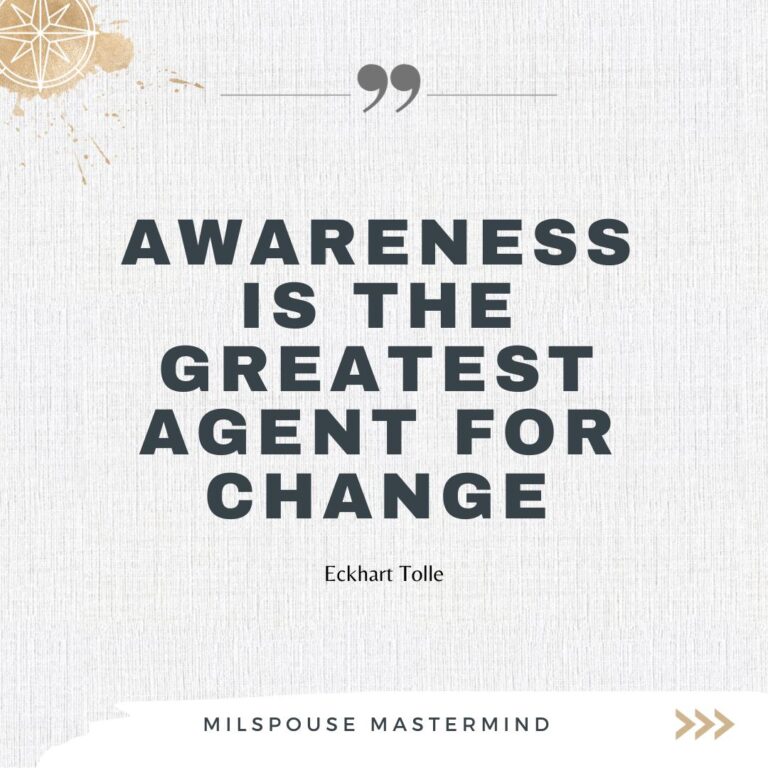
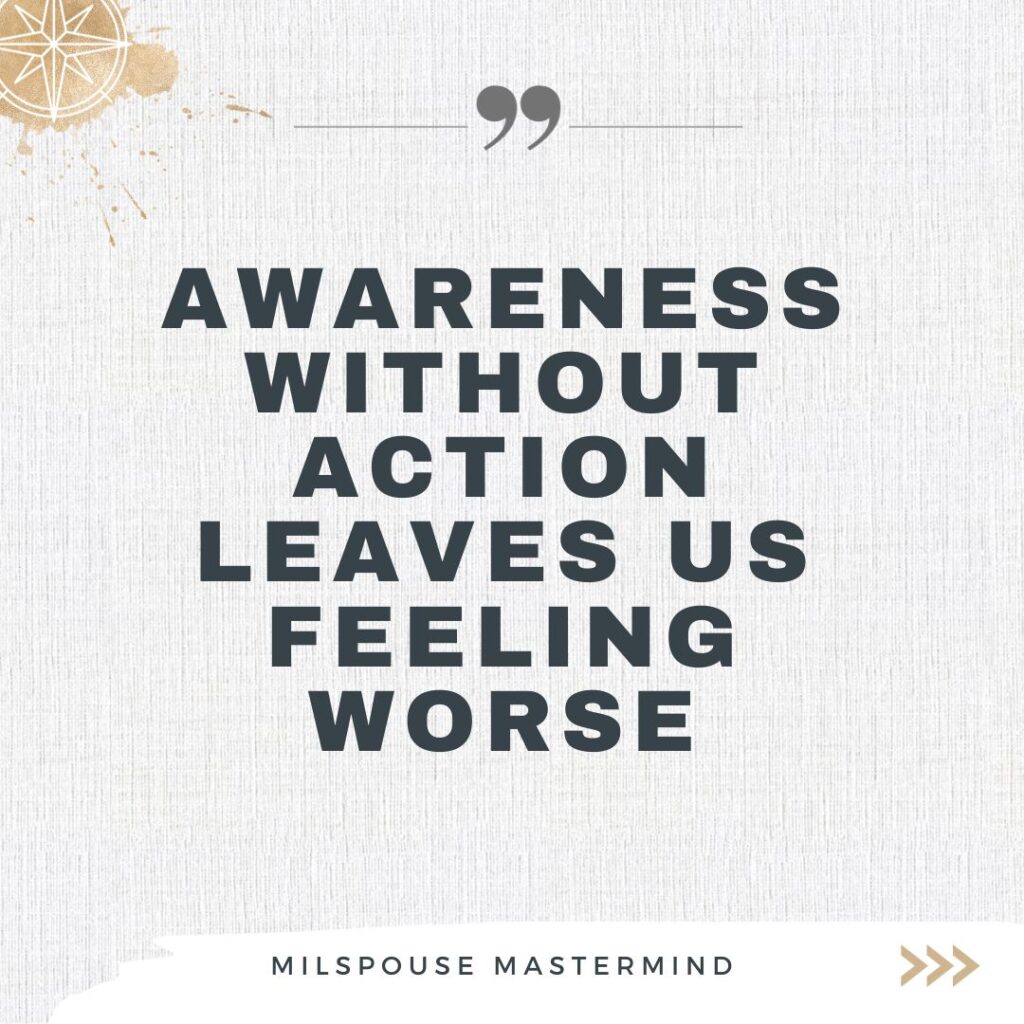
Join the MilSpouse Mastermind Facebook Community!
MILSPOUSE MASTERMIND
© 2023 MILSPOUSE MASTERMIND | ALL RIGHTS RESERVED | TERMS & CONDITIONS | PRIVACY POLICY | CONTACT
Milspouse Purpose Playbook is your step-by-step guide to discovering your identity and purpose. It will help you identify WHO you really are, WHAT you want, and HOW to sustainably set and pursue goals as a military spouse (without burning yourself out in the process).
Get early access to podcasts, exclusive freebies & practical tips to help you thrive as a military spouse, discover what lights you up, and live a life of purpose.